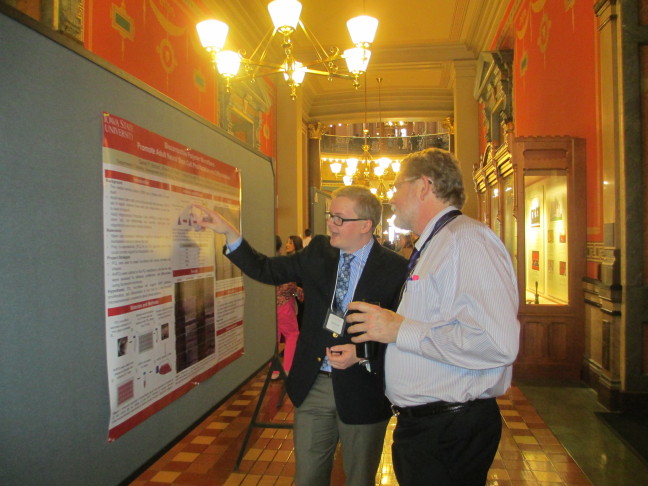AMES, Iowa – Iowa State University undergraduate students will join their peers from the University of Iowa and University of Northern Iowa at the state capitol in April to showcase their research.
The 13th annual Research in the Capitol will be 11 a.m. to 1:30 p.m. Tuesday, April 3, in the rotunda of the state capitol building in Des Moines. Sixty projects – 20 from each Regent university – have been selected. The event is open to the public.
Because some are group projects, 29 Iowa State students will present the 20 selected research posters. Every ISU college will be represented, with research ranging from quality of life in Iowa’s small towns, to technology’s impact on Iowa beef production, to the effects of the First Lady’s use of Twitter.
Research in the Capitol highlights the importance of research in an undergraduate student’s education, as well as each student’s achievements. Students will interact with state officials and news media, discussing the impact their research could have on Iowa, the United States and the world.
Svitlana Zbarska, ISU’s undergraduate research program coordinator, says the event provides a great opportunity for undergraduates to present their research projects, learn about student research being conducted at Iowa’s other public universities, and share their experiences with legislators, media and the general public.
The following Iowa State students will present their research at the event (hometowns, majors and research titles are noted):
- Courtney Carstens, Holstein, journalism and mass communication, “Is Facebook the New Phone Company? Common Carrier Law Provides a Transnational Foundation for Limiting the Power of Online Media Platforms”
- Nathaniel Collins, Altoona, management, “Does Compassion Predict Self-Compassion?”
- Benjamin Dralle, Osage, nutritional science and genetics, “Childhood Obesity Treatment in Iowa: Primary Care Providers’ and Residents’ Practices and Attitudes”
- Adam Gjersvik, Altoona, aerospace engineering, “Faulty Turbine Blade Detection in the Time-Domain from Casing Pressure and Vibration Measurements”
- Julia Hall, Council Bluffs, marketing, “@FLOTUS: How Twitter Changed Our First Lady”
- Kathryn Holmes, Antioch, Illinois, environmental science and community and regional planning, “Evaluating the Effectiveness of Iowa’s Lake Restoration Activities”
- Myra James, Omaha, Nebraska, mechanical engineering, “Comparing the effects of restricting irrigation on diascia and lobelia growth and development”
- Alexander Karnish, Donahue, biology, “How Does Seed Dispersal Affect Population Growth?”
- Kristian Kennedy, Coeur d’Alene, Idaho; Katelyn Judson, Altoona; and Jaclyn Montour, Carlisle; all interior design, “Community Revitalization and Interdisciplinary Design: Rehabilitating Historic Buildings to Conserve Cultural Heritage”
- Nikita Kozak, Urbandale, mechanical engineering, “Implementation of the Actuator Line Method in Finite Element Simulation of Wind Turbine Aerodynamics”
- Caeona Krivolavy, Milford, child, adult and family services, “Personal Perceptions of Destructive Leadership”
- Colette Manley, Inver Grove Heights, Minnesota; and Gabrielle Dirusso, Middletown, Delaware; both animal science, “The potential of a novel technology to positively impact Iowa beef production”
- Zane Satre, Ogden, meteorology, “An Examination of Sudden Warming Events Associated with Cold Fronts in Iowa”
- Skyler Schneekloth, Cedar Rapids, history, “Market Share Inequality in United States Agriculture”
- Morgan Smith, Nevada, microbiology and software engineering, “The Effects of Raw Potato Starch on Salmonella Shedding in Weaning Pigs”
- Tanner Spies, Vinton; Kevin Lin, Council Bluffs; and Eric Spahr, Cary, Illinois; all industrial and manufacturing systems engineering, “Application of 3D printing to food preparation at Ames hospitals”
- Kaylinn Taggart, Council Bluffs, architecture and community and regional planning; Zach Thielen, Bellevue, architecture; and Laura Michaelson, Dakota Dunes, South Dakota, mechanical engineering, “A Mobile Diagnostics Lab for Interdisciplinary Climate Research”
- Isaac Tegeler, Des Moines, computer engineering, “Plant Localization with Deep Learning”
- Curtis Waltmann, Cedar Rapids, materials engineering, “Capping Ligand Vortices as ‘Atomic Orbitals’ in Nanocrystal Self-Assembly”
- James Weatherly, Lebanon, New Hampshire, community and regional planning; Hannah Fisher, Coggon, agriculture and society; and Matthew Lechowicz, Dyer, Indiana, architecture, “Quality of Life in Iowa’s Thriving Small Towns”
